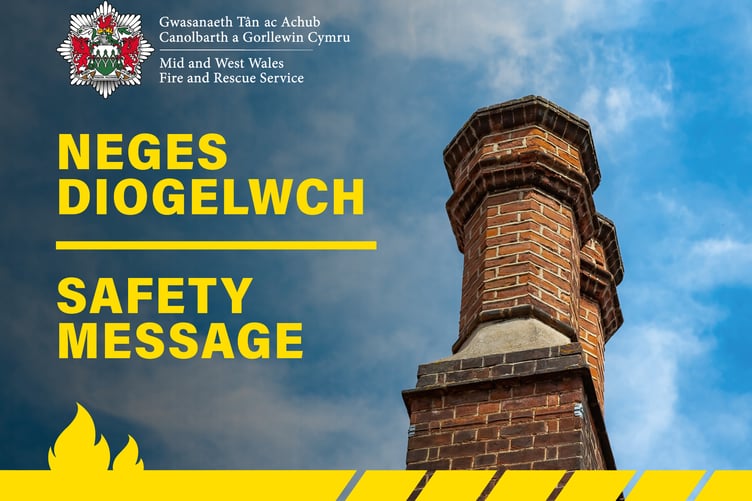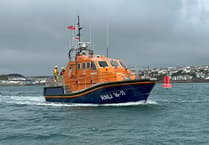Mid and West Wales Fire and Rescue Service (MAWWFRS) is supporting Chimney Fire Safety Week, which runs from September 4-10, 2023.
There’s no denying the summer weather has been disappointing this year and many of us now will be looking ahead and preparing for the autumn and winter months.
Chimney Fire Safety Week aims to raise awareness of chimney fires and the importance of chimney sweeping and appliance maintenance.
In the last 12 months, MAWWFRS has responded to 104 chimney fires.
Chimney fires are commonly started due to an accumulation of soot and can cause extensive damage and in some cases, a danger to life. Most chimney fires are preventable and regular inspection and cleaning of chimney flues will help prevent fires within them.
There are simple steps that can be taken to greatly reduce the chances of having a fire start in a chimney, which include sweeping the chimney before use if it hasn’t been used for some time, ensure a fireguard is in front of the fire at all times, fully extinguishing the fire before going to bed or leaving the house and never using petrol or paraffin to light a fire.
Not only does regular sweeping and maintenance decrease the likelihood of a chimney fire, it can also avoid a dangerous accumulation of carbon monoxide gas. Carbon Monoxide is a highly poisonous gas that has no colour, taste or smell. Fuel burning appliances such as stoves, fires, boilers and water heaters can produce carbon monoxide if they are incorrectly fitted, badly repaired or poorly maintained or if flues, chimneys or vents are blocked.
Smoke and carbon monoxide alarms that are properly working and maintained will save lives.
Area Manager and Corporate Head of Community Risk Management, Peter Greenslade, said:
“We want our community to consider our safety tips for the coming colder months and heating season. While open fires and wood-burning stoves keep homes warm during the winter months, it’s important to remember the importance of correctly maintaining their flues and chimneys. Having the flue inspected regularly can prevent fire breaking out of the chimney in a living space or in the loft.
“Always use a reputable chimney sweep and ensure you have working smoke and carbon monoxide alarms, and ideally one on each level of your home.”
The National Association of Chimney Sweeps has a network of fully-insured members throughout the UK and a useful search facility on their website to find your nearest chimney sweep. HETAS, a not-for-profit organisation that offers a competent person scheme for installers of biomass and solid fuel heating, recommends that chimney sweeping is best carried out by a HETAS Approved Sweep at least once a year, depending upon the appliance and fuel being used.
If you would like further home safety advice and information, you can book a free ‘Safe and Well’ visit by MAWWFRS. Safe and Well visits include home fire safety checks, including checking and fitting of smoke alarms, as well as home security, falls prevention, scam awareness and more.





Comments
This article has no comments yet. Be the first to leave a comment.